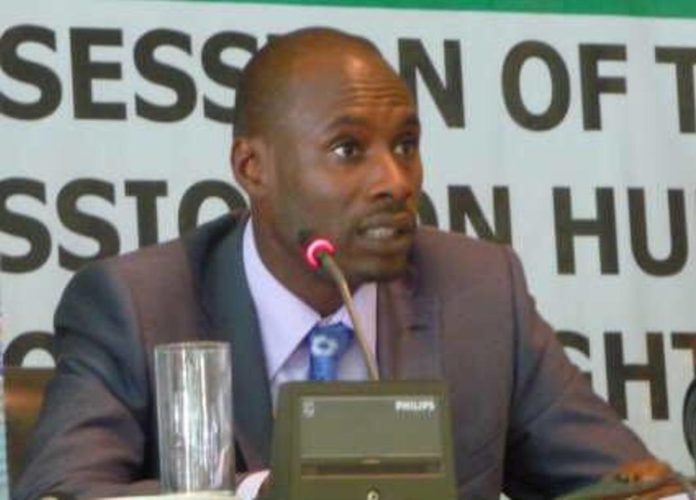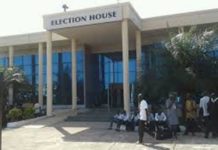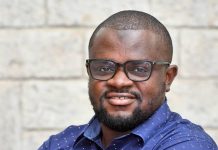By Kebba Mamburay
His name became a signature phrase after the Truth, Reconciliation and Reparations Commission (TRRC) was set up in The Gambia and he was made the lead counsel of the aforesaid commission.
Amid the praises and criticisms directed at him- based on his work- the former lead counsel of the Gambia’s Truth Commission (TRRC) announced his intention to join the growing number of Gambians who want to cruise to victory against President Adama Barrow in the forthcoming presidential run-off.
He did not join a political party to achieve this. Faal opted for an independent candidature. He said it would be arrogant to go to a political party and just want to change them like that. As such, the best course of action was to come up with a plan, which was for him to stand as independent.
“So, I do believe that joining another political party which already has its vision and leadership set, would be difficult to come in and change their thinking and ideas into what would be the best way to turn this country around,” he said. “If I have seen any of the political parties representing the ideas and visions that I have for this country, then perhaps I would have joined one of them,” he added.
Unsurprisingly, Gambians disagreed with his political ambition. While some opined that it’s too early for him to join the country’s political arena, others believed that he is a Gambian and has the right to vote and be voted for.
As part of Foroyaa’s engagement with aspiring candidates for the forthcoming presidential elections, Essa Mbye Faal explained his ambitions and plans for the country if he wins the.
We tee off with conversations he had with his parents- one in particular which spurred him to vie for the country’s topmost position. Faal said he had certain conversations with his parents. And he thought he was a hero in his family because he thought he was doing quite well in the international criminal court, handling interesting cases and making a good living.
Until one day, when his father told him that it was people like him who are responsible for the problems in the country. To his father, these people chose to go abroad, live and work there and focus on helping their family and themselves only, whereas the country is left in the hands of people who are not capable of running this country.
“He (his father) wasn’t speaking to me directly, he was speaking to me and a lot of other people like me, and that got me thinking seriously,” Mr Faal said.
The Gambian international lawyer, who is a defence counsel at the International Criminal Court (ICC) said he had travelled the world over and anywhere he goes, he found Gambians occupying high-profile-positions with impressive qualifications, doing amazing things around the world.
“What is viewed as this country’s biggest assets is its massive human resources, because that human resource is not available to the country to work for the country. A lot of them are abroad helping other countries progress,” he said.
“This got me thinking and I came to realize that there is some credence in what the old man had said. We should be interested in the politics of our country, but the politics here, is left to the people in our country who are not like us, people who are believed to be highly educated and have become very successful in all the things they do, we would have preferred people who are not up to the level to be responsible for the affairs of this country.”
Faal said the country does not have the right leadership to develop it to higher levels. Based on these facts, he said he decided to come in front and take a stance, following a lot of pressure from people both at home and abroad.
On Cost of Living
The poor standard of living in the country too concerns him. Faal said The Gambia is going through difficult times, which is troubling and affecting the society. He likens the daily rise in the cost of living to a run-away train, saying ordinary people can no longer afford decent living without any support from elsewhere.
The rate of inflation is very high as we speak, he added.
“On the examination of the country, sector by sector, is an abysmal failure in almost every regard. The health care system is poor because there are no drugs. Back in history, it used to be the other way around when it comes to medical care: the Senegalese used to come here but now, we go to them instead. Things have changed,” he said.
On the country’s debt
The Gambian international lawyer said The Gambia cannot keep borrowing forever. This would mean mortgaging the future of this country, as he said some parts of certain countries are now being owned by other countries, which to him is offensive to the sovereignty of any country. Mr Faal said there are lots of possible interventions in dealing with Gambia’s debt burden.
“If you’re taking loan(s) continuously to the extent that you can no longer sustain it, you have to stop taking. So, we have to put some sort of moratorium on taking debts, especially the domestic debts. But apart from the moratorium on debts, we have to negotiate a lot of the debts we have. There are possibilities to ask for debt forgiveness, there is a possibility to gain certain concessions like waiver of interest, suspension of payment for a particular period etc.” he said.
He added that there was a programme called HIPC (Highly Indebted Poor Countries) for debt forgiveness. He said there is nothing stopping The Gambia from engaging its development partners and creditors in a bid to negotiate for some of the debts to be converted to grants.
Faal further said the savings that are made can be reinvested into the productive sectors of the economy such as agriculture and other value-added activities.
“So, this can help in reinvigorating the economy and at the same time reduce our debt burden. The bottom line is we need to stop taking loans because it is addictive like smoking cigarettes,” he said.
On Youth Unemployment
Faal said youth unemployment is one of the biggest problems the country is facing right now which has a lot of significant implications. And what it does, he said, is that it fuels irregular migration, crime, and the dependency syndrome. He said all these should be tackled and dealt with.
“The issue is not that the youths don’t want to work, they do. The reason why opportunities are not there is partly because there are no investments in labour intensive sectors of our economy. But the biggest problem is the lack of training, the lack of skills for the youth.
“If you look at The Gambia today, a lot of masons, carpenters, tailors, electricians, and bakers are foreigners. So, a lot of Gambian youths mostly hang around and drink ‘attaya,’ [China green tea]. But it’s not their fault because they do not have any skills,” he said.
According to the aspiring president, the education system should be organized in such a way that it would solve the problems of the Gambian society.
Faal said the jobs are there, but a lot of Gambian youths are not trained to do that job, that’s why the country has a lot of unemployed youths. To him, more mechanics, engineers, masons, welders, and carpenters should be trained rather than training more accountants and lawyers.
“When we invest in our youths, the youths would have jobs because they will have the necessary skills to do certain jobs,” he said.
On agriculture
Mr Faal said agriculture is another problem that the country is grappling with, saying it is in decline because one hardly finds young people in the villages nowadays. This he said is because most of them come to the urban area to search for other opportunities or have taken the back-way for pastures new. He said investment in agriculture would ensure a lot of youths go back to the farms and get a job.
“I went to Jahali Pacharr sometime ago, and only 5% of Jahali Pacharr is being farmed and the rest of the 95% is fallow. Imagine that 90% of Pacharr is farmed, a lot of youths would have jobs on those farms.
“Look at the security sector, it pays better to be a watchman or a house-help than to be a junior officer in the forces. It makes no sense. So, there is no incentive for the youth to join these security forces. And one thing to be done is to turn the army into an engineering, mason, electrical and building force, and they will be doing this for the government with a good pay. It’s our army after all, it’s not like the Gambia would go into war. If you train them and give them skills, they will benefit,” he said.
On Women
Faal said going by the recent trends, females are doing better in schools than their male counterparts.
“If I am elected, in my cabinet, we will have 50-50 fifty percent of male and fifty percent of female in the cabinet,” he said. “But are men ready to share the same table with women in the political spaces?”
Faal concluded that an independent candidate can win without a coalition, but was quick to add his doors are open for discussion.




















